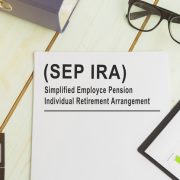A Closer Look At Self-Directed IRA Prohibited Transactions
 The Self-Directed IRA is a tremendously flexible and adaptable savings vehicle, compatible with a vast range of investment contexts and strategies.
The Self-Directed IRA is a tremendously flexible and adaptable savings vehicle, compatible with a vast range of investment contexts and strategies.
But there are some important restrictions, as well – especially the Congressionally imposed list of prohibited transactions detailed in IRC Section 4975(c)(1). If you own a self-directed IRA, or are considering making use of the strategy, it’s critical to understand all of the prohibited transactions. Many have gotten lose or careless with these restrictions – and gotten some nasty surprises when IRS agents disallowed their self-directed IRAs, costing them substantial taxes and penalties.
In most cases there was no good reason for it: The prohibited transactions generally amount to common sense rules that prohibit Self-Directed IRA owners from abusing the structure to shelter themselves from taxes, rather than to use the powerful tax advantages as Congress intended: To help build a firm foundation for a secure retirement income.
Disqualified Persons
The first concept to understand is that of ‘disqualified persons.’ It’s related to other tax rules that make use of the  ‘arms-length’ transaction concept: The IRS takes a dim view of transfers of assets between close relatives – especially at prices below market value – because of the potential for abusing the provision to avoid taxes that would otherwise be due.
‘arms-length’ transaction concept: The IRS takes a dim view of transfers of assets between close relatives – especially at prices below market value – because of the potential for abusing the provision to avoid taxes that would otherwise be due.
Section 4975(c)(2) forbids the transfer of IRA assets between the IRA owner and certain counterparties, called ‘disqualified persons.’ Specifically, the IRS restricts transfers of IRA assets with the account holder’s spouse, lineal descendants, lineal ascendants and spouses of any lineal ascendants and descendants. The law also prohibits Self-Directed IRA owners from transferring IRA assets entities in which any prohibited individual listed above owns a 50 percent interest or more, as well as some directors, employees or partners in those businesses – all of these are considered ‘disqualified persons’ under the law.
Advisors who act as fiduciaries advising the client on the IRA or other account may also be considered disqualified persons.
Penalties
If a disqualified person or entity buys, sells, borrows or lends assets to or from an IRA, the IRS may disqualify the entire IRA, and deem the entire account to have been distributed that year. This may result in income tax (for traditional IRAs, 401(k)s, SEPs and SIMPLES (Roth IRA distributions are tax free if the assets distributed have been in the Roth for five years or more) as well as applicable penalties. The taxpayer forfeits the tax-exemption benefits of the IRA and the entire value is deemed taxable immediately.
[tweetthis twitter_handles=”@iraexpert” hidden_hashtags=”#SelfDirectedIRA #ProhibitedTransactions”]Prohibited transactions…common sense…Self-Directed IRA owners[/tweetthis]
You cannot sell, exchange, lease or lend any IRA assets to or from a disqualified person. That transaction would fall under IRS prohibited transaction rules. The prohibition applies to direct and indirect transfers alike. That is, you cannot avoid the tax liability by employing a middleman or a straw buyer or seller.
Under this rule, even small transactions can have major tax consequences: If you own a real estate IRA and you hire your own child to help paint the fence for minimum wage, and the IRS finds out, they may disqualify the entire IRA, costing you thousands of dollars in taxes and penalties.
Exception: While 401(k) plans and IRAs have similar provisions concerning disqualified persons, it is possible for 401(k) account holders to borrow from their own 401(k) accounts, if the plan sponsor allows for it.
Borrowing Rules
IRAs and other self-directed retirement accounts may employ leverage – that is, borrow money – in order to make investments. However, it may borrow only on a non-recourse basis. The lender can take no collateral or guarantee other than assets within the account. They can have no claim against the IRA or other account holder, personally.
If the account owner signs a personal guarantee for a loan to his or her IRA, the IRA will deem it to be a prohibited transaction. Some owners of IRAs that contain LLCs have been stung by this rule because banks and other lenders commonly ask LLC principals to sign personal guarantees for business loans outside of the IRA context, and don’t always change their procedures to account for IRAs. If the owner doesn’t see the trap, or if the lender doesn’t know the rule, and the account owner signs the form and takes the loan, a prohibited transaction will have occurred.
IRA owners cannot act as cosigners or guarantors on loans – including business accounts of companies held within the IRAs, such as frequently happens when IRAs hold LLCs in so-called “checkbook IRA” arrangements.
Personal Use of Real Estate in IRAs
Account holders who own real estate directly within their IRAs may not use the property for their own pleasure or benefit, nor for that of any other disqualified person. You can’t even stay overnight in the property if you paid the IRA the fair market rental rate for the property, nor can any other disqualified individual.
The more active an individual is in conducting transactions within a self-directed IRA, the greater the potential for a prohibited transaction. The hazard is particularly acute when IRA owners are operating LLCs or C corporations within a self-directed IRA and signing off on many transactions. It is very easy to accidentally commingle personal and IRA assets, or sign a personal guarantee on a short-term loan to the IRA, and jeopardize the entire tax structure.
American IRA, LLC is a leading expert on self-directed IRA administration and compliance. With offices in Charlotte and Asheville, North Carolina, and with clients across the country, American IRA is a go-to expert when it comes to executing self-directed IRA strategies.
For a no obligation consultation, call us today at 866-7500-IRA(472), or peruse our exclusive library of information and resources at www.americanira.com.
Images by: presentermedia.com






